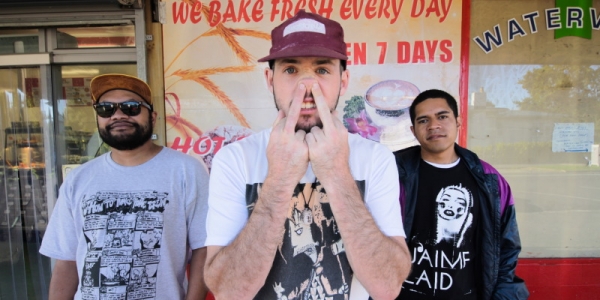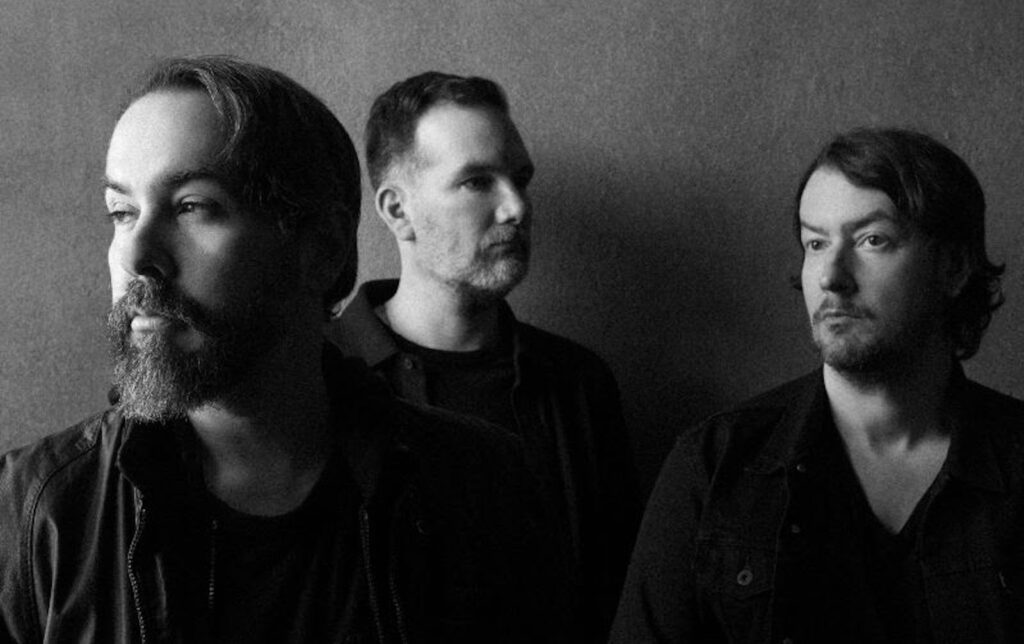“Making music is what we do every day,” says Huavi, the group’s beatmaker. While the statement would ordinarily be lip service coming from some others it rings true for these dudes. From their recordings to their public and on-stage personas Home Brew are authentic. Their laidback, relatable approach, exemplified by brazen lead vocalist Scott, is a major factor in what has made them appeal to a youth audience. This appeal is causing the typical chatter among commentators, offering the usual “think of the children” hysteria that accompanies such musical revolutions. Huavi says even some of their more experienced peers showed some resistance.
“Older people looked down us like a ‘wait your turn’ kind of thing but at the same time we’ve got good music and everyone wants to hear it.” Despite the madness that has accompanied their rise to prominence little has changed for these three mates, though. “We take things by the day, normally, I don’t think anything’s changed really,” the hard working producer confirms. “Tom’s from West Auckland and I’m from South Auckland and we linked up on the Internet and we just started [making] music everyday on the Internet. Then people started coming to our shows,” he sums up succinctly.
Now in full force, the Home Brew invasion will be hitting The Espy on August 10, aided by local rising star Sky’High. Making their first visit to Australia since their formative days in 2009, Huavi believes that they’ll feel perfectly at home. “I’m looking forward to it, there’s a lot of Kiwis over there.” He also confirms that they’ll perform in all their glory with a full band.
Harking back to a more classic sound, Home Brew’s organic use of live instrumentation has earned them many plaudits. The recording process itself starts with the three core members at their studio base as they hash out the beats and lyrics. They then hook up with the instrumentalists, who add their own touch to what has already been laid down. “All of that stuff we leave to those dudes. They’re not pushing us and we’re not there pushing them around. I let them be who they are. I’m not a bass player, I’m not gonna tell a bass player how to play bass.”
Ultimately it’s about a mutual understanding and appreciation, says the man known as Haz Beats. “I sit down with them and tell them what I’m going for. The person I’m talking to will be like ‘I can play that, I can play a variation’ and it ends up being a constant loop sort of thing.” The vibrant energy of tracks like Yellow Snot Funk and Radio reflect that unique chemistry. That energy is also reflected in the changes of tone as they go from social commentary to party music. “It all goes together I guess. The partying, the crying, it’s all in there,” Huavi says with a chuckle. “Most of the songs do say ‘you can have fun here’ or ‘at this point it all ends and at this point you’re crying’. It’s like the ups and downs of life.”
The 21-track album as a whole is the culmination of three years of hard work and while the acclaim keeps rolling in Huavi and his cohorts are doing what they know best – continuing to hit the studio. “Every day we work on music, I’ll be at home writing songs. We write about what we see, our surroundings at the time and everything around us.”
Along with their environment Home Brew also have a unique relationship with their fans. “I got into a fight,” Huavi explains rather calmly, about his recent encounter with what would be considered a ‘fan’. What he leaves out, though, is the fact that this fight received national news coverage in New Zealand, accompanied by pictures of the producer-DJ with a bruised face. For most other groups that would be a sign to take a rest, but not the boys from Home Brew. “I wasn’t going to make it [to our next show] but our manager got me some crutches so I went down there.” Details about the fight spread on their Facebook page before the gig, with many thinking he would not attend. “I was like ‘fuck that shit, I’m going to come see you guys’. They were appreciative of that.”
Bruises and all, seemingly nothing can stop the crew from rocking the crowd. “I was on stage with crutches and a balaclava to cover my black eyes. But then all they wanted to see was my face,” he says with a hearty laugh. “I got to sit down for a few songs at least so it wasn’t too bad on my ankles. At one point I fell over and one of the fans picked me up. I was like ‘fuck, thanks.’” Maintaining a positive attitude he believes there could even be benefits to having scars. “A friend told me Australian girls like dudes with scars, so I’m hoping the scar heals up real nice for you,” he says with just enough sarcasm.
While bruises and black eyes are a badge of honour there’s one thing Huavi is still getting used to: male groupies. “[After gigs] I just get male groupies all the time, I think the girls go home. No girls come up to us, it’s just dudes all the time. They’re like ‘hey bro, hey bro’ and it’s cool, but can some girls come up and talk to us?” As he goes on to describe the scene it sounds more and more like the makings of an epidemic. “We have female fans but the majority of our fans are muzza dudes elbowing chicks so they can be in the front row. Look at Justin Bieber, he doesn’t have male groupies, he has female groupies. That’s all we want. I mean we love you, keep supporting us, thank you, but at the same time please don’t maul us like we’re a gang. As long as they maul us no girl will come up and talk to us.”
Even as they have to keep an eye out for fans both male and female, nothing can affect their passion about getting out and performing. Leading up to the release of their debut album the group embarked on several back-to-back shows, driving around New Zealand. “There was a show every night. We’d get to the venue, get an hour’s sleep, soundcheck, whatever and it was like that for a whole month. I’m not complaining but sometimes it’s draining man.” Huavi promises, however, that they will be revved up to go come their visit to Australia. After their three Aussie shows Home Brew are also looking to wreak their brand of musical havoc in other parts of the globe.
“We’ve definitely discussed it. I actually wanted to do Japan but we decided to do Australia first, build it up and then take over the world.” Much of the key to their popularity and success stems from their accessibility when it comes to fans and their hard partying approach to gigs. “Our gigs never used to be like this. We stopped doing regular gigs and started throwing proper parties. That’s what we always try to achieve. We try to make it like a party we would want to go. It’s like a circus, people get to know it and word spreads.” You could consider them the ringmasters of their own movement. “We try to build a following and we’re trying to create a community where everyone comes to party. Outside of Auckland you’ve gotta find the party but we’re always with the party people.”
Social media has also played an important role in developing their following, something they clearly work hard on. “I was nothing without the Internet,” Huavi jokes. “Just having that online base where people can interact and buy music, it’s much easier than trying to sell music out of your [car] boot. It’s the same thing but more people can see it online rather [than] you standing around looking stupid outside a shop.” As he sees it they are dealers of audio drugs, giving fans a fix. “We’re always working on stuff and we want them to hear it. It’s like a heroin addict, you give them a free taste and they’ll be back.” You can always count on Home Brew to keep it real.
BY ANDREW ‘HAZARD’ HICKEY







